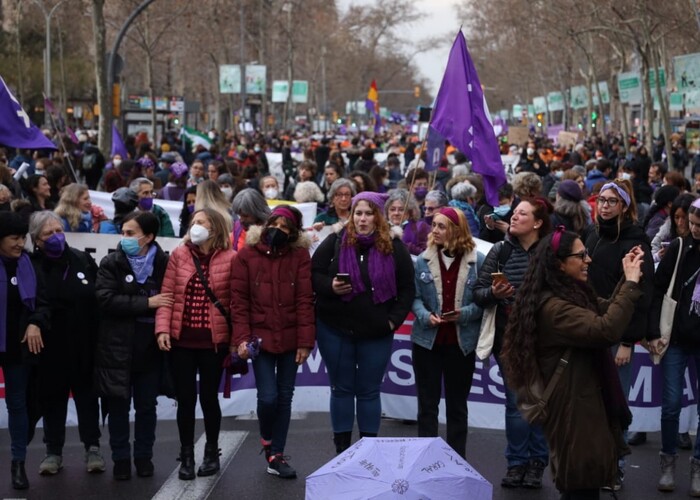MADRID – Thousands of women took to the streets this Tuesday, March 8, to claim more equality on International Women’s Day. They just didn’t do it in unison. The dissenters question the policy of the Spanish Ministry of Equality.
In particular with regard to the trans law, which will make self-determination about sex possible. This movement takes inspiration from abolitionism, the struggle to abolish black slavery in colonies. 8M’s main demonstrations began in several cities across the country around 7.00 pm.
On Tuesday at the 8M demonstration, Spain’s Minister for Equality, Irene Montero, stated that “the feminist movement has always organised itself on the basis of its diversity and plurality”, but nevertheless “has always been able to put a common agenda on the table.” That agenda advocates the end of violence, the fair distribution of wealth, time and care, shared responsibility, and respect for diversity.”
Madrid
In Madrid, the manifestation of the 8M Commission departed from Atocha-Almudena Grandes station to Plaza de Colón. While the breakaway feminist movement will move along Gran Vía to Plaza de España. In total, about 6,000 people were on their feet.
Isabel Díaz Ayuso, the president of the Madrid region, indicated on Tuesday that “everyone is celebrating in their own way” and that she herself will be working, as she also “will do tomorrow and did yesterday” to help the people of Madrid to represent.
At the front of the demonstration at Atocha was a group of Afghan women. They want attention for the situation they experience in their country because of their gender since the return of the Taliban regime. Above all, they ask the world not to forget them.
Barcelona
In the Catalan capital, the International Women’s Day rally started a few minutes after 6.00 pm. Plaza Universitat de Barcelona was the starting point. According to the organisation, around 60,000 people gathered here, and according to the Guardia Urbana, 16,000 people were involved, mostly women of all ages, who sang songs, played ‘batucadas’, and shouted slogans.
One of the Assamblea 8M spokespersons, Dolores Pulido, said he was pleased that the demonstrations have returned to pre-corona normality. As for the organizers, the pandemic has exacerbated the systematic precarious conditions in which all women live. Pulido also said that this year’s manifestation is all about peace.
As a novelty this year, the organisers are transporting the public address system with bicycles instead of trucks. The respect committee has developed a self-defense protocol. From the starting square, the demonstrators move to the Arc de Triomf. This is where the closing act takes place and the manifesto is read. Then there are musical performances.
Galicia and International Women’s Day
Throughout Galicia, the provinces have organized demonstrations and events on the occasion of 8M. On some occasions, support for the plight of many women and girls in Ukraine has prevailed.
The president of the Xunta, Alberto Núñez Feijóo, said his government is working on a new equality law that will put the Community “at the forefront of the fight” against gender discrimination. There will also be a special status for rural women and fishermen. This makes Galicia the first region to give legal status to the minimum requirements for training on equality.
In addition, Galician women can be proud of the recognition from the Ministry of Health, which has emphasised that they are the “motor of health” in the region. After all, they make up 80% of the healthcare staff.
Valencia
The centre of Valencia also turned purple during this 8M. A large mass of women “openly abolitionist” who, under the slogan “Women are making a feminist revolution”, want to overthrow the patriarchy, end all sexist violence, and face all wars, “in which women are still the currency “.
More than 200 associations took part in this march, where some political representatives were also seen, such as the president of the Generalitat, Ximo Puig, the vice president, Mónica Oltra, the mayor of Valencia, Joan Ribó, or the deputy of the government, Gloria Calero.
The closing manifesto was read by four women, each representing a different reality: a young woman, an elderly woman, a migrant, and a disabled woman. The women demanded “an abolition of prostitution laws, pornography, and rented wombs”. In addition, they called for urgent action to eradicate poverty among women.
Andalusia
Thousands of people took part in demonstrations organised by feminist groups in many Andalucian provinces.
According to data from representatives of the Spanish government, there were a total of 65 concentrations during the day in the southern Spanish region of Andalucia, 36 in the provinces, and 28 in the capitals.
Some 1,300 people gathered in Seville in the morning and 3,000 in the afternoon, summoned by the CCOO and UGT unions. Antonio Muñoz, mayor of Seville, was present at the demonstration. In Malaga, the police counted 5,000 participants and another nearly 3,000 in Cádiz. A further 3,500 people demonstrated in Huelva. The biggest manifestation took place in Granada. Under the slogan ‘Not invisible, not precarious, rights for everyone’, no fewer than 30,000 people gathered.


